- Home
- Al Sarrantonio
House Haunted
House Haunted Read online
House Haunted
By Al Sarrantonio
First Digital Edition published by Crossroad Press
Copyright 2011 Al Sarrantonio
Cover design by David Dodd / Copy-Edited by Patricia Lee Macomber
Part of the cover image provided by http://citronvert79.deviantart.com/journal/32671262/
LICENSE NOTES:
This eBook is licensed for your personal enjoyment only. This eBook may not be re-sold or given away to other people. If you would like to share this book with another person, please purchase an additional copy for each person you share it with. If you're reading this book and did not purchase it, or it was not purchased for your use only, then you should return the vendor of your choice and purchase your own copy. Thank you for respecting the hard work of this author.
ALSO FROM AL SARRANTONIO & CROSSROAD PRESS
Novels:
Moonbane
Skeletons
October
West Texas
Kitt Peak
The Boy With Penny Eyes
Collections:
Toybox
Halloween & Other Seasons
BUY DIRECT FROM CROSSROAD PRESS & SAVE
Try any title from CROSSROAD PRESS. Use the Coupon Code FIRSTBOOK for a onetime 20% savings! We have a wide variety of eBook and Audiobook titles available.
Find us at: http://store.crossroadpress.com
For
PETER SCHNEIDER
MELISSA SINGER,
GINJER BUCHANAN
And
JANNA SILVERSTEIN,
Who Believe in Ghosts
Why do you weep?
The bells are not ringing,
The town is asleep.
The night at your window
Is nestled in deep.
The stars in the heavens
Are gently singing—
Why do you weep?
—French lullaby
ONE:
THE FOUR POINTS
1. WEST
In the early morning he looked out through his window to where the green of the lawn sloped down the hills to show a thin band of the Pacific, the ocean's blue-orange glint a metallic complement to the living color of grass.
Sometimes during the day he sat at the window and read, or moved his head to the right or left, or imagined that his legs worked. Sometimes he imagined that he could climb through the open window and run down the slope of living lawn over the hills to the hot sand of the beach, and feel its soft grit slide between his live toes, and then leap feet first into the water, and feel the cool-hot slap of salted wetness on the pads of his feet, and feel the wet up his legs, displacing the air on his body, rushing to cover his eyes and head until there was nothing but ocean surrounding him. And he imagined himself opening his eyes beneath the water, his cheeks puffed out like a breathing fish, to see the white sandy bottom, making it rise in languid dust-devils. And he imagined pressing his hand flat on the bottom, feeling the swell of the tide, the lap of waves against his legs as he pushed himself upward, the tight uncomfortable feeling just beginning in his chest. And he imagined rising majestically to the surface, letting the deoxygenated air out of his lungs with a satisfied blow and pulling dry, sweet, new air into himself.
Sometimes he imagined that.
Sometimes he sat with dull eyes in front of the television, or pushed the buttons on the arm of the wheelchair that rolled him into the white kitchen to the lowered sink and stove, where he put water into the pot and boiled it, waiting for the insistent whining push of steam, listening to the roiling, churning, tortured water yanked out of tranquility and thrust into hot air. When the water was boiling, he turned the heat down and poured it into the filter brewer, watching water metamorphose into coffee as it dripped into the deep carafe sitting on the electric plate that kept it warm. He drank a lot of coffee. Sometimes he listened to the woman from Mexico who came to clean the house. He listened to her stories about her country, her family, her solid Catholic faith. He watched her eyes, the deep certainty in them, looking for and finding the long pain she had endured. One son in a Mexican jail, caught smuggling; another son an illegal, somewhere in Nevada; a husband who had renounced his faith and divorced her to live with a girl of twenty. He made her sit and have coffee with him, studying the deep lines of her face as she talked. There was a daughter who wrote her regularly, who had married a Colombian businessman; she prayed he was not involved with drugs, because he had money and never spoke of how he made it. She said she kissed her daughter's letters. She kissed the stamps on the envelopes. He would listen to her until she would rise abruptly, thinking she was foolish to pour her heart out to him, uncomfortable at the gringo's staring silences, and say she had work to do.
Sometimes, he knew, she looked at him as if he were mad.
He never left the house. In the front room, the television was always on. In the bedroom, the radio always played, tuned to a news channel: sometimes, when he concentrated, the radio gave him the illusion that there was a human voice with him, overriding the memories, the demons in his head.
When he was with the Mexican woman, sometimes her voice, her careful English, overrode the memories.
When the housekeeper went home in the early afternoon, he went to the front room and looked out the window again, at the clear green line of the far water or the green of the sloping hills or at the flowers that bordered the path down the hills to the water. When the men came once a week to cut the grass on the front lawn, he watched their slow work, watched the uneven wild green lawn become a smooth pleasant carpet. He tried to smell the odor of new mowing from his window.
He kept the grounds neat. A man came in to fix the porch in the back when it needed painting or when boards needed replacing, and he had the foundation of the house shored up when it began to sag. The house looked as it always had. At night, the wide windows stayed open, and he looked out at the stars or the clouds, watched the moon's slow progress and changing shape. Often he slept in the wheelchair, and awoke to find his shoulders aching from the angle of his rest or his hand asleep on the telephone beside him.
Sometimes, he thought about the bag of white powder in the locked desk drawer under the telephone. He thought ironically of the Mexican woman's fears for her daughter's husband.
Perhaps the Mexican woman thought him mad because there were telephone extensions throughout the house, in every room. Even when he looked through the window, or talked with the housekeeper, listening to her stories, or gave in, before sleep, exhausted, to the screaming memories in his head, his hand was always on a telephone. Sometimes it rang, but he knew the difference, that it was only someone calling to ask him to subscribe to Time, or to ask him to take out insurance for his credit cards. He never answered the phone when it rang like that. When it rang the other way, then he would answer. Bridget had told him the call would come, and when it did, he would go to her wherever she was and destroy her.
Sometimes he sat staring out the window at the back of the house, toward the woods, and the memories in his head talked. And sometimes he listened, because it was good to remember why he waited day after day, with patient, long hate, in a house haunted by memories.
Memory. . .
They called it the Haunted Hut, because, the bigger kids said, the spirit of the hobo who'd hung himself there still inhabited it. The hobo had lived in it for years, after the Korean War. He never bothered anybody. Rusty Kranepool, who was in the third grade but came over to play toy soldiers with Ray because his father had taken all his away, saying, “No kid of mine is going to play with war toys” (forgetting, of course, that he'd done almost nothing else himself when he was Rusty's age, and he'd turned out a CPA and not a blood-guzzling war lover), had told him that his older brot
her Dan had once sneaked up on the lean-to with his friends to spy on the hermit. At first it was quiet, but then they'd heard something going on inside the shack. There were scraping sounds and a low voice. There was silence again, until the front door suddenly burst open and the hobo came out, waving a hickory cane in front of him, screaming, “Get away from me! Get away!” At first Danny and his friends thought the man was yelling at them, but the hobo turned away from them, waving the cane over his head and running into the woods. They waited a little while. When he didn't come back, they decided to creep up to the shack. They had just stepped out of their hiding place when the hobo returned, moving the cane weakly in front of him and sobbing, muttering to himself. When he saw Dan and his friends, he began to scream again, but in a different way, “No! Go away!” He charged at them with his cane raised, cursing, and they ran off into the woods. A month later he was found hung inside his shack. He had looped a belt over a big hook screwed into the center beam of the ceiling. There was a kicked-over chair at his feet. The only strange thing about it, something that one of the sheriff's new deputies wanted to look into until the sheriff told him not to bother, that folks didn't care, was that apparently the man had tried to burn down the shack before he hung himself in it. In one corner they had found a can of kerosene, half empty. He had doused a rolled-up rug and lit it. The rug and part of the floor was burned black, but it looked as though the fire had gone out on its own. The new deputy thought that maybe someone had tried to burn the place down to hide the fact that they'd hung the hermit, but the sheriff had told him to go down to Route 22 and catch speeders instead of thinking so much.
“You want to go see it?” Rusty said. They were in the clearing in the woods out behind Ray's house, moving regiments of Ray's toy soldiers from the sitting rock that looked as though it had dropped from the sky to the spot next to the sandpit.
“No,” Ray answered, not looking up.
“You scared?” Rusty said, with the insinuating sneer any ten year old uses when playing with an eight year old.
Ray stopped posing his GI Joe in the sand and looked at his friend sideways. He shrugged.
“Not allowed?” Rusty smiled, immediately knowing he had scored a direct hit.
“I could if I wanted to.”
“Why don't you want to? I've been there plenty of times.”
Ray shrugged. “I just don't want to.”
“That's bull,” Rusty pursued. “Your mom said you can't go out there, and that's all there is to it.”
“She's not my—” he started to say, but then he said nothing, trying to turn his attention, and Rusty's, back to the soldiers embedded in the sand battlefield.
Rusty wasn't going to give up. “Come on,” he said, standing.
Ray looked down at the clutched soldier in his hand.
“Look,” Rusty said earnestly, kneeling on one knee in front of Ray. “I'll be with you, and your mom won't even know. We'll come right back. I just want to see what it looks like.”
“I thought you said you've been there.”
“I haven't seen it in a while,” Rusty answered defensively. He stood up, started to walk in the direction of the thick woods. “Coming?”
Ray looked at Rusty's face, the daring on it burning into him, telling him, Go ahead, defy her, she's not your mother anyway. She wants to be but she's not; she's only a woman named Anne who married your father and tried to take your mother's memory away from you. She's too nice, nobody's that nice. All she wants is to suck your mother out of you like a vampire and put herself inside. She's not your mother.
Go ahead.
And then he was up on his feet and following Rusty. Only Rusty had stopped at the edge of the thick woods. He stood still, his face red, staring past Ray, and Ray turned around and there was Anne, holding Tony in her arms, looking at the two of them, standing quietly on the path leading back to the house.
“Your mother called, Rusty,” she said. “She wants you home.”
They went back to the house, and Rusty went home, and Ray had a snack, and then he asked if he could go back to the sandpit and Anne said yes. She was doing the dishes; Tony, in the playpen next to the kitchen table, waving his hands in the air, making little sounds.
Anne was poised over the sink as he got up to leave. She was humming in a low voice to an old song by the Temptations playing on the radio she kept on the counter next to the sink.
“Wait a minute,” she said, stopping her humming as he walked behind her to get to the back door.
“Sorry.” He went back to the table and picked up his plate and glass and brought them to her. She put them in the sink and turned back to him,
“Was Rusty going to take you to that shack in the woods?” she asked.
“No,” he answered, too quickly.
“Are you sure?” she said. She was talking as if she were his mother, and part of him wanted to cry and tell the truth. But she wasn't his mother.
“We just played with soldiers.”
“All right.” She frowned. “But I don't want you back there. It's dangerous and it's not part of our property. You hear me?”
“Yes.”
Her eyes stayed on him, trying to be his mother, but then she turned back to her dishes and began to sing with the beginning of another song on the radio.
“Remember what I said, Ray,” she reminded him in her quiet voice.
He went out past the tree with the tree house in it, past the toolshed where, when his mother was still alive, they had once found a dead cat after coming back from vacation. He went into the stand of trees, threading his way expertly to the clearing with the sitting rock and sandpit. The afternoon was quiet. There were high trees around him, with the leaves on them that sounded as though they were whispering to one another when the wind blew. There was no wind, and no whispering. Ray looked into the sandpit, at the scattered toy soldiers. There were plastic dinosaurs buried there, and a lucky silver dollar he had hidden in a box and buried below the sand. He'd figured anyone looking for it would stop digging when they hit the bottom of the sandpit, so he'd gone down five inches farther into wet cold dirt.
He played with the soldiers awhile, having them line up on a lip of the rock and then charge down into the sand, throwing cloudfuls of sand up to simulate a sandstorm on Mars, making sand mountains to be ploughed by the superior artillery of GI Joe.
His eyes wandered to the thick trees leading to the Haunted Hut, to the mostly overgrown, thin path that marked the way.
Go ahead.
He stood, dropping the two soldiers he held into the pile of sand at his feet; a weak plume of sand dust rose; the end of the battle. He stood facing the path and the trees with his hands in his front pockets.
She's not my mother.
He started for the trees.
The way was easy when he got onto the path and away from the clearing. The trees weren't as thick as they looked; there was a lot of dead wood, big trunks split by lightning, trees growing too close together losing the fight for available sun. The path became wide enough for a small truck—and, indeed, he saw two faint ruts overgrown with weeds and grass where tire treads had once rolled, when the hobo's hut had been the one-room, Walden-like summer home of a reclusive writer in the twenties.
The trees thickened, then suddenly cleared out.
Go—
He stopped cold, suddenly standing before the Haunted Hut.
Something besides guilt (She's not my mother!) told him to turn back. A creeping spider of hair rose up his back at the sight of the place in the summer afternoon. A breeze had come up; the trees had started to whisper.
Afraid.
He stood still, hands in pockets, staring at the wood frame covered by a mass of weeds. It looked like a tiny, neglected house—like the witch's house in Hansel and Gretel ten neglected years after the witch had been baked in her oven. There was a white, chipped wooden bench in front. There were shutters on the windows, one of them hanging crookedly by its top hinge. They had once
been painted a deep green, but now were flaking paint, revealing an earlier brown coat underneath.
Get out, his guilt and that other thing, the whispering fear, told him.
She's not my mother.
There was a gaping hole where the front door had been. The corner to the left of the door was chaffed through, showing rough, singed timber and wallboard through the encroaching weeds.
Ray took his hands from his pockets and moved tentatively to the front entrance.
It was dark inside. There were four windows, glazed with dust; two were blocked from daylight by tall grass. He edged in closer, stepping so that he was neither in nor out of the house.
Go.
Stay.
He stepped in.
It was very dark. A wave of fear passed over him, taking the air from his lungs. His eye caught movement.
Someone was behind him, moving across the entrance. He turned, but the doorway was empty.
Panic filled him. He looked back in the Haunted Hut; in one corner, he imagined flames rolling off the kerosenesoaked rug, licking the walls, flat sheets of orange fire rising and joining, racing around the top of the shack to form a whirling tornado of heat. Then he saw the flames snuffed by an invisible hand. He saw the hobo beating at the air with his cane, then saw him suddenly swinging from the rotting overhead beam, legs kicking helplessly, seeking a chair that had been yanked aside.
Go. Run away.
She's not my mo—
“Hello, Ray.”
He turned to see his mother standing in the doorway of the Haunted Hut. No—it wasn't his mother. But it was as if his mother's unknown double had been poured out of the invisible air before him. He felt a gasping sob of recognition and longing rise up his throat.

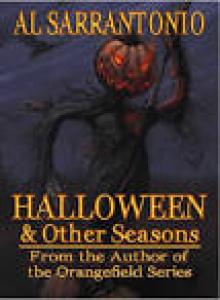 Five World Saga 01 Hornets and Others
Five World Saga 01 Hornets and Others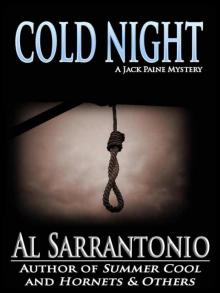 Cold Night (Jack Paine Mysteries)
Cold Night (Jack Paine Mysteries)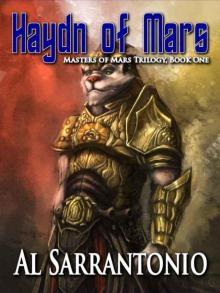 Haydn of Mars
Haydn of Mars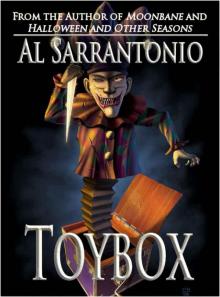 Toybox
Toybox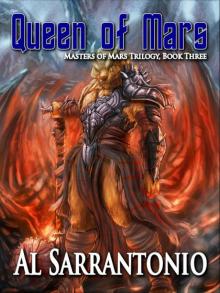 Queen of Mars - Book III in the Masters of Mars Trilogy
Queen of Mars - Book III in the Masters of Mars Trilogy Exile
Exile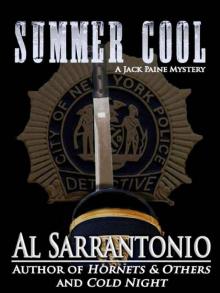 Summer Cool - A Jack Paine Mystery (Jack Paine Mysteries)
Summer Cool - A Jack Paine Mystery (Jack Paine Mysteries) Return - Book III of the Five Worlds Trilogy
Return - Book III of the Five Worlds Trilogy The Orangefield Cycle Omnibus
The Orangefield Cycle Omnibus Summer Cool jp-2
Summer Cool jp-2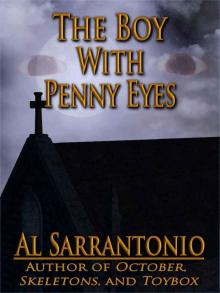 The Boy With Penny Eyes
The Boy With Penny Eyes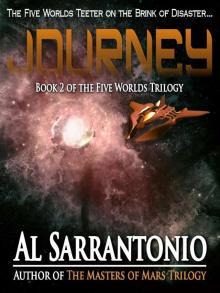 Journey - Book II of the Five Worlds Trilogy
Journey - Book II of the Five Worlds Trilogy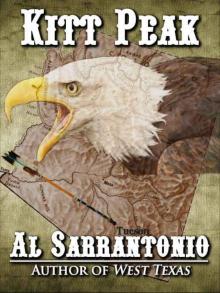 Kitt Peak
Kitt Peak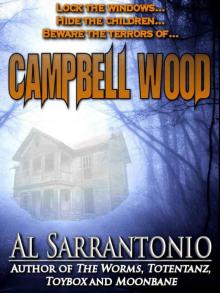 Campbell Wood
Campbell Wood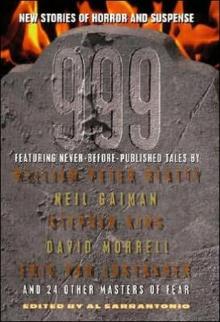 999
999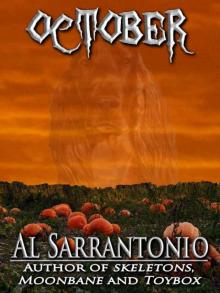 October
October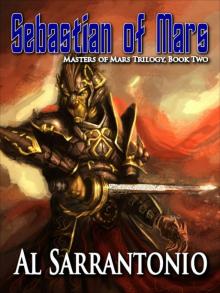 Sebastian of Mars
Sebastian of Mars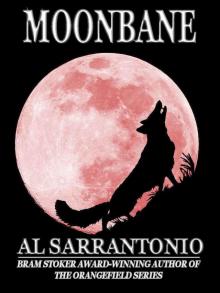 Moonbane
Moonbane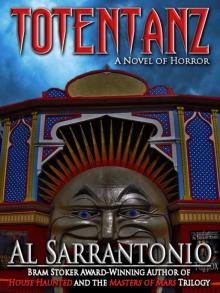 Totentanz
Totentanz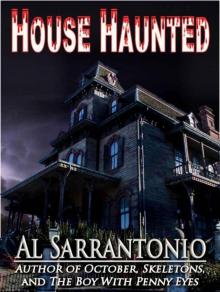 House Haunted
House Haunted Halloweenland
Halloweenland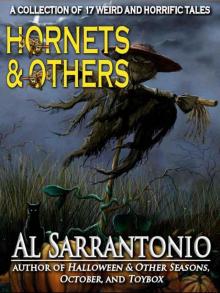 Hornets and Others
Hornets and Others